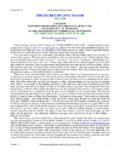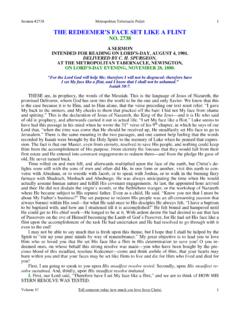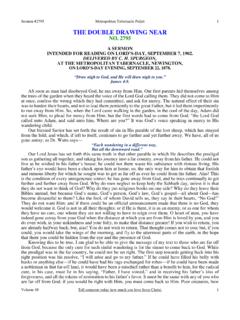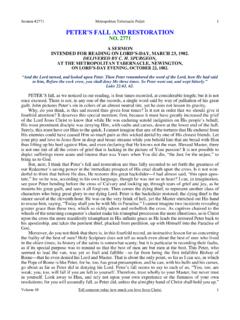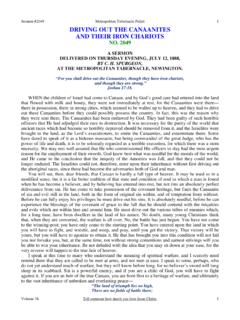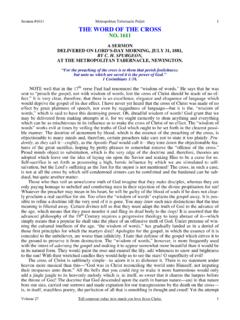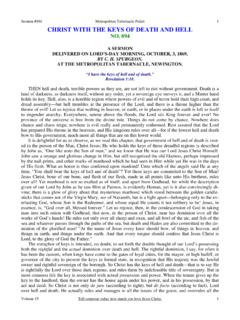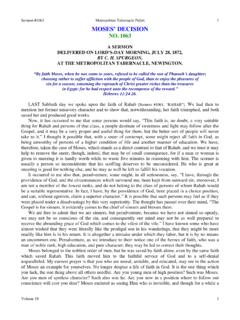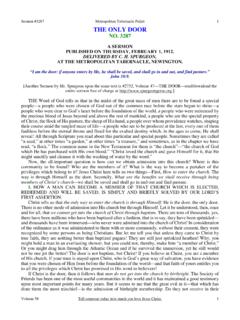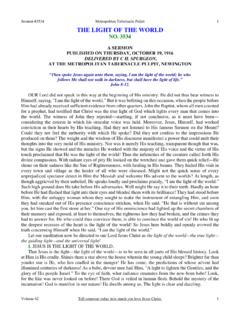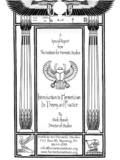Transcription of Sermon #421 Metropolitan Tabernacle Pulpit 1 IT …
1 Sermon # 421 metropolitan tabernacle pulpit 1 Volume 7 1 IT IS FINISHED! NO. 421 A Sermon DELIVERED ON SUNDAY MORNING, DECEMBER 1, 1861, BY THE REV. C. H. SPURGEON, AT THE Metropolitan Tabernacle , NEWINGTON. When Jesus therefore had received the vinegar, he said, It is finished: and he bowed his head and gave up the ghost. John 19:30. MY brethren, I would have you attentively observe the singular clearness, power, and quickness of the Savior s mind in the last agonies of death. When pains and groans attend the last hour, they frequently have the effect of discomposing the mind, so that it is not possible for the dying man to collect his thoughts, or having collected them, to utter them so that they can be understood by others. In no case could we expect a remarkable exercise of memory or a profound judgment upon deep subjects from an expiring man. But the Redeemer s last acts were full of wisdom and prudence, although His sufferings were beyond all measure excruciating.
2 Mark how clearly He perceived the significance of every type! How plainly He could read with dying eye those divine symbols which the eyes of angels could only desire to look into. He saw the secrets which have bewildered sages and astonished seers, all fulfilled in His own body. Nor must we fail to observe the power and comprehensiveness by which He grasped the chain which binds the shadowy past with the sun-lit present. We must not forget the brilliance of that intelligence which threaded all the ceremonies and sacrifices on one string of thought, beheld all the prophecies as one great revelation, and all the promises as the heralds of one person and then said of the whole, It is finished, finished in me. What quickness of mind was that which enabled Him to traverse all the centuries of prophecy, to penetrate the eternity of the covenant, and then to anticipate the eternal glories!
3 And all this when He is mocked by multitudes of enemies, and when His hands and feet are nailed to the cross! What force of mind the Savior must have possessed, to soar above those Alps of Agony, which touched the very clouds. In what a singular mental condition must He have been during the period of His crucifixion, to be able to review the whole roll of inspiration! Now, this remark may not seem to be of any great value, but I think its value lies in certain inferences that may be drawn from it. We have sometimes heard it said, How could Christ, in so short a time, bear suffering which should be equivalent to the torments the eternal torments of hell? Our reply is, we are not capable of judging what the Son of God might do even in a moment, much less what He might do and what He might suffer in His life and in His death. It has been frequently affirmed by persons who have been rescued from drowning, that the mind of a drowning man is singularly active.
4 One who, after being some time in the water, was at last painfully restored, said that the whole of his history seemed to come before his mind while he was sinking and that if anyone had asked him how long he had been in the water, he would have said twenty years, whereas he had only been there for a moment or two. The wild romance of Mohamed s journey upon Alborak is not an unfitting illustration. He affirmed that when the angel came in vision to take him on his celebrated journey to Jerusalem, he went through all the seven heavens and saw all the wonders thereof, and yet he was gone so short a time, that though the angel s wing had touched a basin of water when they started, they returned soon enough to prevent the water from being spilt. The long dream of the epileptic impostor may really have occupied but a second of time. It Is Finished! Sermon #421 Volume 7 2 2 The intellect of mortal man is such that, if God wills it, when it is in certain states, it can think out centuries of thought at once, it can go through in one instant what we would have supposed would have taken years upon years of time for it to know or feel.
5 We think, therefore, that from the Savior s singular clearness and quickness of intellect upon the cross, it is very possible that He did in the space of two or three hours endure, not only the agony which might have been contained in centuries, but even an equivalent for that which might be comprehended in everlasting punishment. At any rate, it is not for us to say that it could not be so. When the Deity is arrayed in manhood, then manhood becomes omnipotent to suffer, and just as the feet of Christ were once Almighty to tread the seas, so now His whole body became Almighty to dive into the great waters, to endure an immersion in unknown agonies. Do not, I pray, let us attempt to measure Christ s sufferings by the finite line of your own ignorant reason, but let us know and believe that what He endured there was accepted by God as an equivalent for all our pains, and therefore it could not have been a trifle, but must have been all that Hart conceived it to be, when he says He bore All that incarnate God could bear, With strength enough, but none to spare.
6 My discourse will, I have no doubt, more fully illustrate the remark with which I have commenced. Let us proceed to it at once. First, let us hear the text and understand it, then, let us hear it and wonder at it, and then, thirdly, let us hear it and proclaim it. I. LET US HEAR THE TEXT AND UNDERSTAND IT. The Son of God has been made man. He has had a life of perfect virtue and of total self-denial. He has been all that life despised and rejected of men, a man of sorrows and acquainted with grief. His enemies have been legion, His friends have been few and those few faithless. He is at last delivered over into the hands of them that hate Him. He is arrested while in the act of prayer, He is arraigned before both the spiritual and temporal courts. He is robed in mockery and then unrobed in shame. He is set upon His throne in scorn and then tied to the pillar in cruelty. He is declared innocent and yet He is delivered up by the judge who ought to have preserved Him from His persecutors.
7 He is dragged through the streets of that Jerusalem which had killed the prophets and would now crimson itself with the blood of the prophets Master. He is brought to the cross. He is nailed fast to the cruel wood. The sun burns Him. His cruel wounds increase the fever. God forsakes Him. My God, my God, why hast thou forsaken me? contains the concentrated anguish of the world. While He hangs there in mortal conflict with sin and Satan, His heart is broken, His limbs are dislocated. Heaven fails Him, for the sun is veiled in darkness. Earth forsakes Him, for His disciples forsook him and fled. He looks everywhere and there is none to help. He casts His eye around and there is no man that can share His toil. He treads the winepress alone and of all the people there is none with Him. On, on, He goes, steadily determined to drink the last dreg of that cup which must not pass from Him if His Father s will be done.
8 At last, He cries, It is finished. and He gives up the ghost. Hear it, Christians, hear this shout of triumph as it rings today with all the freshness and force which it had eighteen hundred years ago! Hear it from the sacred Word and from the Savior s lips, and may the Spirit of God open your ears that you may hear as the learned, and understand what you hear. 1. What meant the Savior, then, by this, It is finished ? He meant, first of all, that all the types, promises, and prophecies were now fully accomplished in Him. Those who are acquainted with the original will find that the words, It is finished, occur twice within three verses. In the twenty-eighth verse, we have the word in the Greek, it is translated in our version accomplished, but there it stands, After this, Jesus knowing that all things were now finished, that the Scripture might be fulfilled, said, I thirst. And then, He afterwards said, It is finished.
9 This leads us to see His meaning very clearly, that all the Scripture was now fulfilled, that when He said, It is finished, the whole book, from the first to the last, in both the law and the prophets, was finished in Him. Sermon #421 It Is Finished! Volume 7 3 3 There is not a single jewel of promise, from that first emerald which fell on the threshold of Eden, to that last sapphire-stone of Malachi, which was not set in the breastplate of the true High Priest. Nay, there is not a type, from the red heifer downward to the turtle dove, from the hyssop upwards to Solomon s temple itself, which was not fulfilled in Him. And not a prophecy, whether spoken on Chebar s bank, or on the shores of Jordan, not a dream of wise men, whether they had received it in Babylon, or in Samaria, or in Judea, which was not now fully worked out in Christ Jesus. And brethren, what a wonderful thing it is, that a mass of promises, and prophecies, and types, apparently so heterogeneous, should all be accomplished in one person!
10 Take away Christ for one moment and I will give the Old Testament to any wise man living and say to him, Take this. This is a problem, go home and construct in your imagination an ideal character who shall exactly fit all that which is herein foreshadowed. Remember, he must be a prophet like unto Moses and yet a champion like Joshua. He must be an Aaron and a Melchizedek, he must be both David and Solomon, Noah and Jonah, Judah and Joseph. Nay, he must not only be the lamb that was slain, and the scapegoat that was not slain, the turtledove that was dipped in blood, and the priest who slew the bird, but he must be the altar, the Tabernacle , the mercy seat, and the showbread. Nay, to puzzle this wise man further, we remind him of prophecies so apparently contradictory, that one would think they never could meet in one man. Such as these, All kings shall fall down before him and all nations shall serve him, and yet He is despised and rejected of men.
